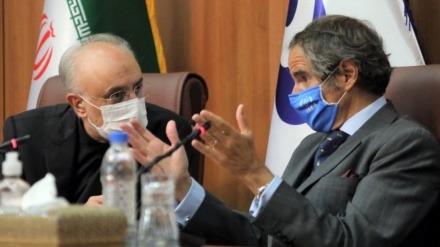Speaking in an interview with the website of the Strategic Council on Foreign Relations, Seyed Reza Mirtaher, referring to the strategy of continuing Iran’s cooperation with the International Atomic Energy Agency (IAEA) despite the leak of confidential information by that international organization, said: But in practice Iran gave the IAEA a chance, and while it was supposed to suspend the implementation of the Additional Protocol altogether, it retained cameras and surveillance tools.
He said that Iran has a positive attitude towards the continuation of the JCPOA, adding: Accordingly, despite the measures taken to reduce obligations of the JCPOA, it still left the way open to resume its obligations, and according to that, Europe and especially the United States must fulfill their obligations within a three-month period, especially the lifting of sanctions against Iran, so that Iran can return to fulfilling its JCPOA obligations.
Iran showed its maximum goodwill in the JCPOA
Mirtaher said: With the three-month deadline set by Iran for the United States and Europe, in fact, it showed its maximum goodwill towards the JCPOA to the other parties.
Referring to Iran’s efforts to maintain relations with the IAEA at a reasonable level despite the leak of Iran’s confidential information and the West’s inaction on the implementation of the JCPOA, Mirtaher stressed: Iran’s action came at a time when the Biden administration, with an irrational and extravagant approach, is urging Iran to return to the full implementation of its JCPOA commitments without guaranteeing that it will take effective action in return, especially in lifting sanctions.
He added: This issue creates a lot of difficulties; because in any case, it was the Americans who withdrew from the JCPOA nuclear deal, and the fact that the party that is to be blamed, urges the party that is not to be blamed to re-assume new commitments, without even any special guarantee from the United States that the obligations will be fulfilled, is irrational and extravagant.
The expert on international affairs, saying that a bipolar view has been formed inside Iran regarding cooperation with the International Atomic Energy Agency, noted: On the one hand, Mr. Rouhani’s government believes that we should not destroy all the steps behind us or we should take cautious steps to be considered a sign of good faith; while the opposition front, the crystallization of which is the Majlis, is more likely to believe that decisive action is needed to force the Westerners to lift sanctions against Iran, even if such actions lead to possible strong reactions from other parties to the JCPOA, especially the European members and possibly the US.
In conclusion, Mirtaher added: In any case, we see that the first approach has become more acceptable, at least at the present time, and now Iran is practically within the framework of that approach, and the fact that the Supreme Leader advised the Majlis to talk to the government to resolve the issue lends further proof to this.










0 Comments